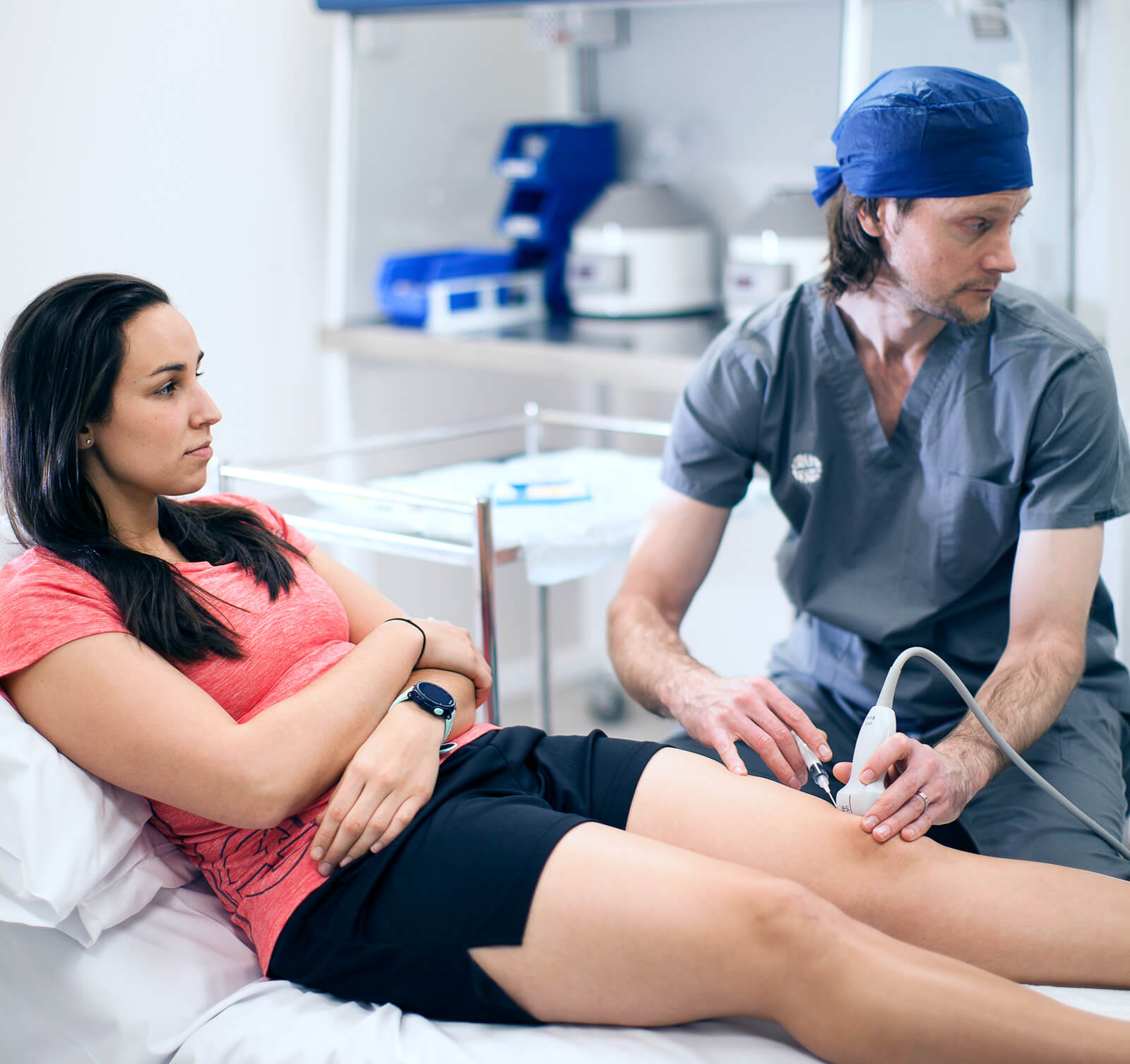What is platelet rich plasma (PRP)?
PRP is a growth factor rich medium that is developed from your own blood. It is not synthetic. Research has shown PRP to be effective in the treatment of many musculoskeletal conditions.Why consider PRP?
- Osteoarthritis - PRP is indicated in mild to moderate osteoarthritis where pain is not controlled by other conservative measures, such as simple analgesics. Studies have shown significant reduction in osteoarthritic knee pain within 5weeks post injection and continued improvement in symptoms for up to one year or more.
- Tendinopathy - PRP can be effective in the treatment of tendinopathy in combination with an appropriate rehabilitation program with improvement in pain and function and return to pre-injury activities. Studies have also shown PRP to promote a healing response at the site of injury.
What is involved?
PRP involves up to 3 injections for tendinopathy and a total of 3 injections performed at 1-4 weekly intervals in the treatment of osteoarthritis. Blood is taken prior to injections for the generation of PRP. Patients are required to stop taking anti-inflammatory tablets one week prior to donating blood. Patients taking regular aspirin should continue to take this as prescribed by their general practitioner. Each procedure will take approximately 45 minutes.Risks
- Bleeding/bruising
- Infection - To reduce chance of infection, all injections are done under sterile conditions using ultrasound guidance for accuracy.
- Pain/discomfort - Injections can be uncomfortable (particularly in the treatment of tendon injuries) and proportion of patients experience mild to moderate discomfort post injection. Where possible a regional nerve block is performed to improve comfort.
Contra-indications
Whilst very safe, the use of PRP is not recommended in the following conditions:- Pregnancy
- Some bleeding disorders
Post injection instructions
- Pain flare - To improve the comfort of the procedure, local anaesthetic is infiltrated at site of the injection. Where possible a regional nerve block is performed. Some patients may experience a small flare of their pain after the local anaesthetic wears off. This can last between 12 - 72 hours. You may need to take simple analgesia (i.e. paracetamol) if you experience any discomfort post PRP therapy. You will be supplied with a script from your treating doctor for stronger analgesia/pain relief if required.
- Return to activity/work - Patients in low-moderate impact work roles may need up to 3 days off work due to potential discomfort. Higher impact jobs that require heavy lifting may need longer. It is advised that patients should not return to their regular work/activities until their pain has returned to their pre-injection level of comfort.
- Exercise/rehabilitation post-injection - It is advised that patients should re-commence their exercise/strengthening rehabilitation program (physiotherapy guided) when their pain returns to pre-injection baseline levels.
Evidence
Research has shown PRP to be effective in the treatment of achieving pain and functional improvement in mild to moderate osteoarthritis and also in the treatment of tendinopathyCost
Please contact the Lifecare clinic directly as costs may vary. PRP is not covered by Medicare or private health insurance.Research articles
- Spakova, et al. Treatment of Knee Joint Osteoarthritis with Autologous Platelet-Rich Plasma in Comparison with Hyaluronic Acid. Am J Phys Med & Rehab 2012;91(5):411-417
- Kon et al. Platelet-rich plasma: intra-articular knee injections produced favorable results on degenerative cartilage lesion, Knee Surg Sport Traumatol Arthrosc, 2009, Online Publication
- Baltzer, et al. Autologous conditioned serum is an effective treatment for knee osteoarthritis, Osteo and Cartilage 2009, 17:152-160 Sanchez, et al. Intra-articular injection of autologous preparation rich in growth factors for the treatment of knee OA: a retrospective cohort study, Clin Exp Rheumatol. 2008, 26(5):910-913
- Drengk, et al. Influence of platelet-rich plasma on chondrogenic differentiation and proliferation of chondrocytes and mesenchymal stem cells. Cells Tissues Organs 2009; 189(5):317-26.
- Saito, et al. Intraarticular administration of platelet-rich plasma with biodegradable gelatin hydrogel microspheres prevents osteoarthritis progression in the rabbit knee, Clin Exp Rheumatol 2009, 27(2): 201-207.
- Creaney et al (2011) Growth Factor-Based Therapies Provide Additional Benefit Beyond Physical Therapy in Resistant Elbow Tendinopathy: A Prospective, Single-Blind, Randomised Trial of Autologous Blood Injections Versus Platelet-Rich Plasma Injections. Br J Sports Med, Online Publication
- Rabago et al (2009) A Systematic Review of Four Injection Therapies for Lateral Epicondylosis: Prolotherapy, Whole Blood and Platelet-Rich Plasma. Br J Sports Med;43:471-481
- Freitag J, Barnard A, Rotstein A. Photoactivated platelet-rich plasma therapy for a traumatic knee chondral lesion. Case Reports. 2012 Dec 17;2012:bcr2012006858.
- Freitag JB, Barnard A. To evaluate the effect of combining photo-activation therapy with platelet-rich plasma injections for the novel treatment of osteoarthritis. Case Reports. 2013 Mar 26;2013:bcr2012007463.
- Freitag J. The effect of photoactivated platelet-rich plasma injections in the novel treatment of shoulder osteoarthritis. International Journal of Case Reports and Images. 2014 Aug 1;5(8):546.
- Freitag J, Lenssen R, Slimmon D, Balster S. The effect of platelet-rich plasma injections in the non-surgical treatment of a partial rotator cuff tear. Int J Case Rep Images. 2014 Jul 1;5(7):524-30.

